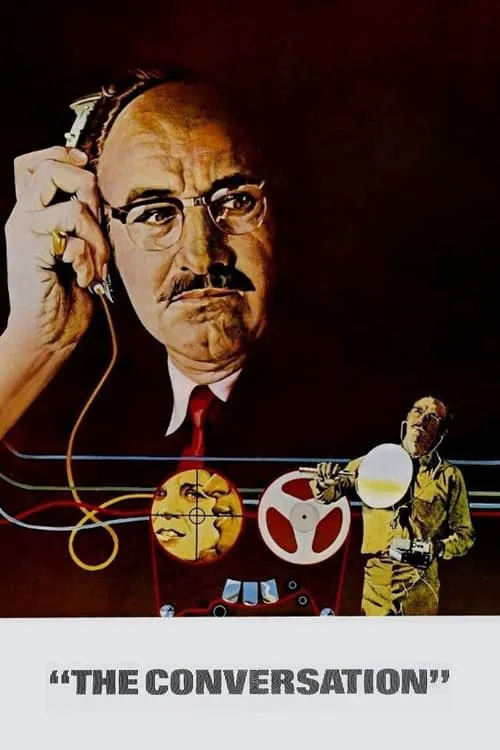The Conversation

Plot
The Conversation is a thought-provoking psychological thriller directed by Francis Ford Coppola, released in 1974. The film is a masterclass in suspense and subtlety, exploring themes of paranoia, surveillance, and the darker aspects of human nature. At its core, the movie follows Harry Caul (played by Gene Hackman), a skilled surveillance expert who is hired by government agents to tap the phone calls of a mysterious couple, Ann (Cindy Williams) and Mark (Frederic Forrest). The story begins with Harry, a skilled technician who works for a company that specializes in eavesdropping on conversations. He is hired by a group of government agents, known as the 'Agency,' to record a conversation between Ann and Mark, a couple who are walking through the city streets. As part of his job, Harry and his team position themselves in various locations throughout the city to capture the couple's entire conversation. The surveillance equipment they use includes state-of-the-art devices, which allow for the simultaneous recording of conversations from multiple rooms and streets. Harry's obsession with capturing the conversation is mirrored by his growing paranoia. He struggles to reconcile his profession with his personal values, as he increasingly questions the motives of his clients. As he becomes more entangled in the couple's lives, Harry begins to suspect that they may be in grave danger. He experiences a moral crisis, as he starts to wonder whether he is contributing to their demise or inadvertently helping them. Throughout the film, Harry's inner turmoil is conveyed through a series of flashbacks and voiceovers, which explore his past and provide insight into his troubled psyche. These devices reveal Harry's troubled past, marked by tragedy and loss, which has led him to become increasingly isolated and detached. His relationships are shallow and superficial, and his sense of empathy is slowly eroded by his profession. As Harry becomes more convinced that Ann and Mark will be murdered, he finds himself torn between his duty to complete the job and his growing sense of compassion for the couple. His actions become more erratic, and he starts to take risks that jeopardize his own safety. Harry's investigation leads him to suspect that the Agency is not what they seem, and he begins to doubt the true intentions of his clients. One of the standout aspects of The Conversation is its exploration of the theme of surveillance. The film was released in the 1970s, a time of great social upheaval and concern about government overreach. The Conversation taps into this cultural zeitgeist, offering a scathing critique of the dangers of unchecked surveillance. The film's focus on the power dynamics between the surveillor and the surveilled is both thought-provoking and unsettling. Gene Hackman's performance as Harry Caul is a highlight of the film. His portrayal is nuanced and complex, capturing the contradictions of a man torn between his profession and his morality. Hackman brings a depth and subtlety to the character, making Harry both relatable and terrifying. The Conversation is also notable for its use of sound design and visual composition. The film's sound engineer, Walter Murch, uses innovative techniques to create a sense of unease and tension. The sound is often muted or distorted, mirroring Harry's growing paranoia. The cinematography, handled by Freddie Francis, is stark and clinical, reflecting Harry's detachment from the world around him. As the story reaches its climax, Harry's investigation comes to a head. He tracks down the location of the Agency's office, where he discovers the true intentions of his clients. However, the film's conclusion is intentionally vague, leaving the audience to wonder whether Harry's intervention has prevented a tragedy or made it more likely. The Conversation is a thought-provoking and visually stunning film that explores the darker aspects of human nature. It is a powerful critique of surveillance and the dangers of unchecked power. At its heart, the movie is a psychological exploration of a troubled individual, struggling to reconcile his profession with his values. The film's themes and ideas continue to resonate today, making it a timeless classic of American cinema.
Reviews
Recommendations




